 Atul Kochhar, chef patron of Benares in Berkeley Square, is renowned for combining traditional and contemporary elements in his innovative take on Indian cuisine. Having gained a Michelin star first at Tamarind in 2001 then at his current restaurant in 2007, his unique blend of regional Indian cooking with a modern British twist has been frequently imitated but never matched. At the heart of his cuisine is the balance of flavours and textures in sometimes unusual combinations, where spicing, for warmth and aroma rather than heat, is acutely judged, thereby enhancing, rather than overwhelming the true flavour of top quality British produce. Minute attention to detail and elegant presentation do full justice to a seemingly inexhaustible creativity which has elevated Indian cuisine from curry house staple to sophisticated fine dining
Atul Kochhar, chef patron of Benares in Berkeley Square, is renowned for combining traditional and contemporary elements in his innovative take on Indian cuisine. Having gained a Michelin star first at Tamarind in 2001 then at his current restaurant in 2007, his unique blend of regional Indian cooking with a modern British twist has been frequently imitated but never matched. At the heart of his cuisine is the balance of flavours and textures in sometimes unusual combinations, where spicing, for warmth and aroma rather than heat, is acutely judged, thereby enhancing, rather than overwhelming the true flavour of top quality British produce. Minute attention to detail and elegant presentation do full justice to a seemingly inexhaustible creativity which has elevated Indian cuisine from curry house staple to sophisticated fine dining
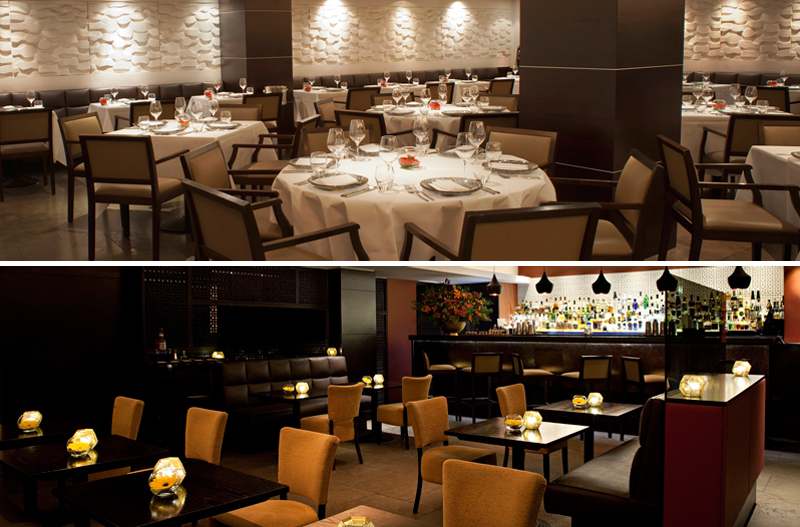
The restaurant itself also bears signs of traditional Indian and modern British design and décor. The stylish interior, especially in the mural of rowing boats on the Ganges in the reception area, hand-crafted furniture and the lily pond water feature speak of the subcontinent. On the first floor, the elegant bar and glass-walled wine cellar are thoroughly modern British. So too is the low ceilinged 120 seat restaurant with five private dining areas. Decorated in tones of black and white, with dark wood screens, textured walls and extensive spotlighting, the spacious room exudes understated luxury and sophistication. Well-spaced, albeit small, tables are dressed in fine napery, whilst comfortable seating is provided by low chairs and banquettes.
A variety of menus includes a good value three courses set lunch at £35 and a carte where starters range from £14 to £27, mains from £26 to £36 and desserts £9.50 to £12. A Street Food Menu, designed to be eaten by hand” are priced individually or £30 for five sharing dishes.These prices are realistic given the impeccable quality and provenance of the ingredients, the skill and flair shown in cooking, the generosity of the portions and the artful presentation, not to mention the luxurious dining room and prestigious location in the heart of Mayfair.
Fine Dining Guide visited on a busy lunchtime in mid-May, opting for the seven course tasting menu with a flight of “Captivating” wines. Pairing Asian food with wine has always been a challenge for even the most experienced of sommeliers. That Benares offers flights of either “Captivating” or “Prestigious” wines chosen from their extensive list is a testament to the confidence it has in its offering.
Famed for the inventive yet judicious use of spices, this expertise extends to the two vodka based signature cocktails. The first, a green martini with coriander, chilli and tamarind marinade balanced spicy and sour flavours. The other, mixed with a homemade chutney of passion fruit and chilli flakes was equally refreshing. Both were enjoyed between nibbles of mini lentil popadoms with freshly made apricot, tomato and gooseberry chutneys.
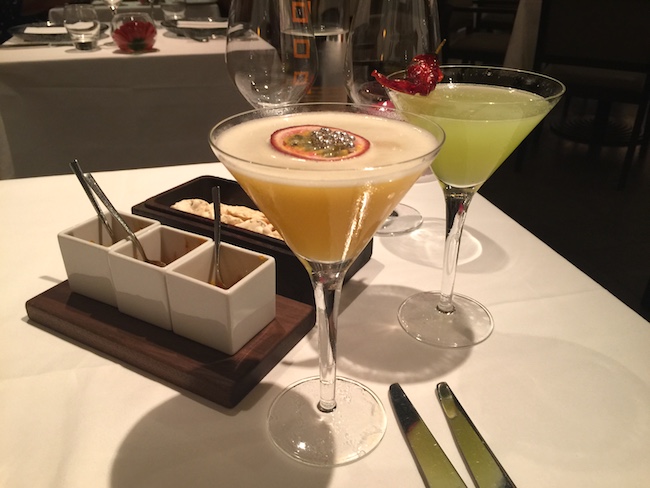
The amuse bouche which opened the tasting menu elevated a staple of North Indian street food to a sophisticated fine dining starter. Potato and sweet potato chaat, enveloped in yoghurt foam and scattered with marinated pomegranate seeds, was lighter, sweeter and more refined than humbler versions.
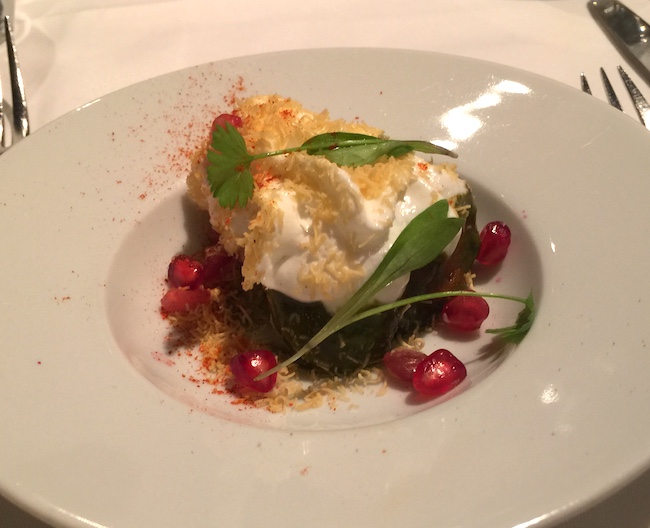
An aromatic shellfish course featured a plump seared scallop, with a sesame and coriander crust and soft, succulent flesh, paired with a succulent king prawn pickled in five spices including cumin and mustard seeds, fenugreek and fennel. Tomato chutney and slow roasted tomato gave sweetness to balance the subtle spicing – which also included a fragrant pine nut podi – allowing the natural flavours of the shellfish to shine. This composite dish of contrasting textures, temperatures and flavours was a tour de force for creativity and invention. Wine: 2014 Viognier, Clay Station, Lodi, California, USA
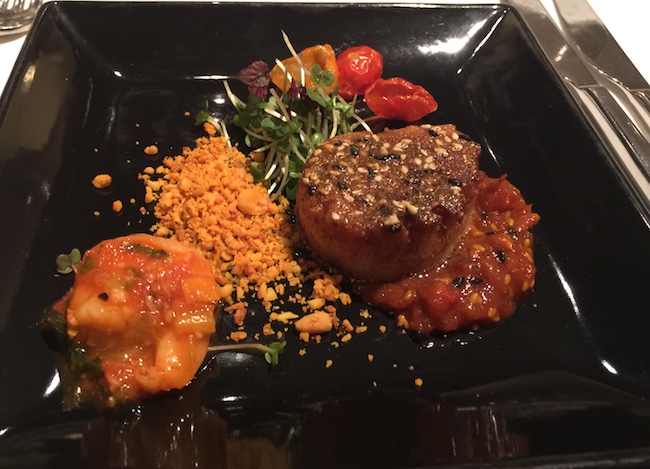
Tandoori Chicken Tikka pie for two – a playful Indian take on the French pithivier? – had delicate domed pastry case surrounding a creamy, mildly spiced filling. Mixed berry chutney, perhaps a little too sweet – proved a good foil, enlivening the whole dish. Wine: 2014 Soave La Rocca, Pieropan, Veneto, Italy
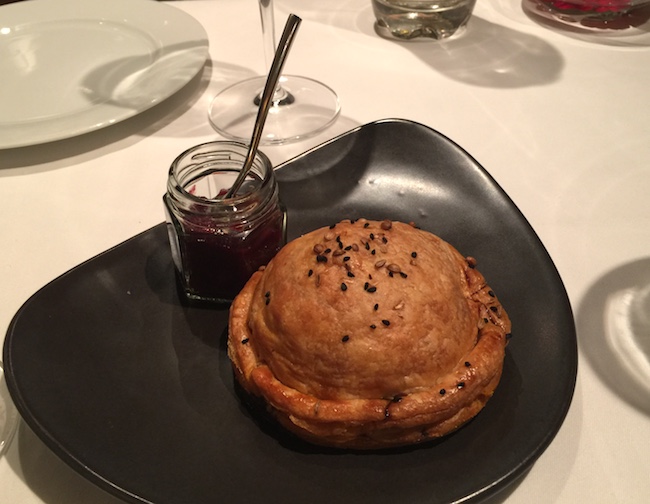
The fish course saw a tranche of marinated Scottish salmon cooked in charcoal tandoor. The gentle smokiness enhanced the rich flavour of this oily fish, which retained its moistness despite being cooked at an extreme temperature. Finished with a moulee sauce of coconut, curry leaf and mustard seeds poured at the table, the Keralan influence was clearly in evidence. In contrast, the accompaniments of Cornish crab croquette perched on tomato chutney, spiced vermicelli and a swirl of beetroot puree revealed some modern British influences. Overall the components worked well together, making this a well-conceived, skilfully executed and elegantly presented dish. Wine: 2013 Gewurztraminer Atul’s Signature, Jean Claude Gueth, Alsace, France.
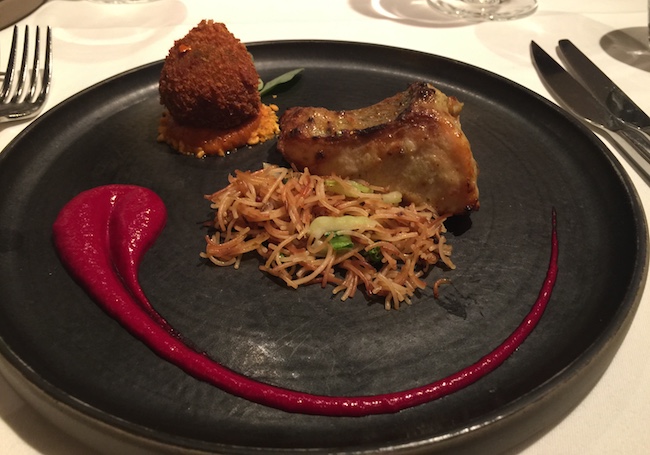
Sorbets as an intermediate course have lost favour in modern European tasting menus. How pleasing it is to see them in Atul Kochhar’s repertoire. Indeed, the lime sherbet with fresh mint and roasted cumin embraced mainly citric, with hints of herbal and spice flavours, proving to be a most refreshing palate cleanser.
Compared with the preceding dishes, the main course was relatively simple but no less accomplished. Two cuts of English lamb treated in different ways: rump, arguably the most flavoursome, was simply roasted whereas the cutlet was marinated in Kashmiri red chilli and cooked in the tandoor. Again, accurate timing in the cooking and resting maximised the rich flavour and tenderness of the meat. The accompanying mildly spiced Rogan jus set off the meat perfectly.
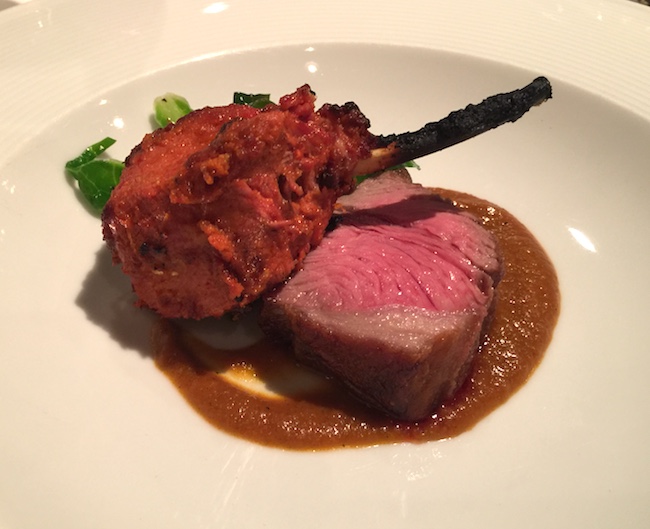
Side dishes were also carefully rendered. Pilau rice was fluffy and fragrant, parathas flaky and buttery; and Dai Makhani, (the black lentils cooked for 12 hours in cream and butter) being slightly sweet, thick but not mushy. Wine: 2013 Pinot Noir Muddy Water, Waipara, New Zealand savour, leather – perfect match
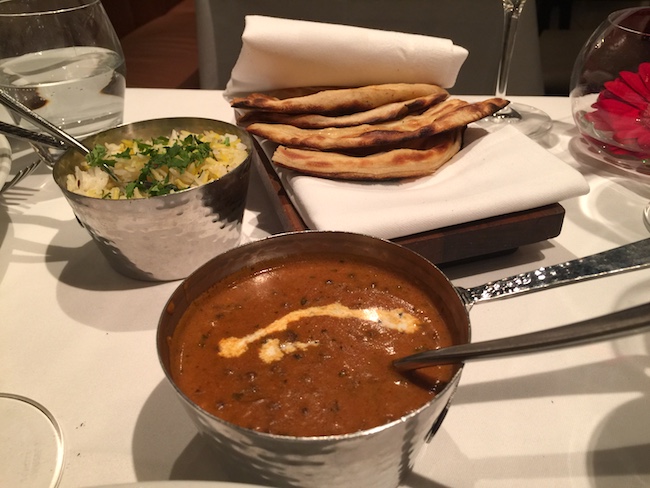
Finally, for dessert, chocolate lava cake with its molten filling worked well with an intense raspberry jelly and Bhapa Doi, the steamed yoghurt being delicately lifted, not overpowered, by rose water. Wine: 014 Eradus Sticky Micky, Late Harvest Sauvignon, Marlborough, New Zealand.
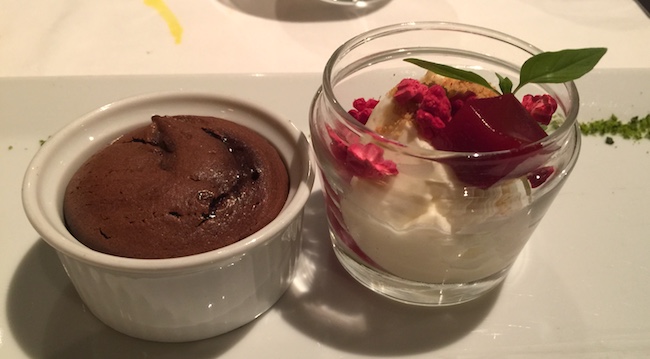
Overall, this was an outstanding tasting menu. The experience was enhanced by the highly professional front of house team ably led by restaurant manager Mukesh Pandey.

Welcoming and attentive but not intrusive, informative without being condescending, the carefully timed, seamless service ran like a well-oiled machine, but one with personality and good humour.
It is hardly surprising that Benares remains the leading gastronomic Indian restaurant, having retained a Michelin star for ten years. Fine Dining Guide is confident in its continued success and will follow its future progress with interest.



